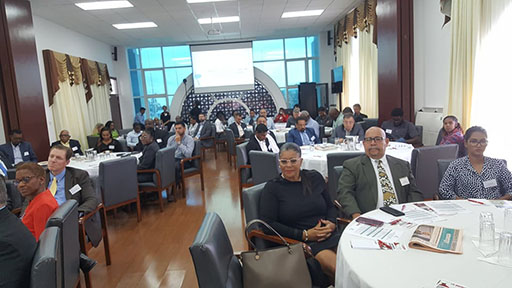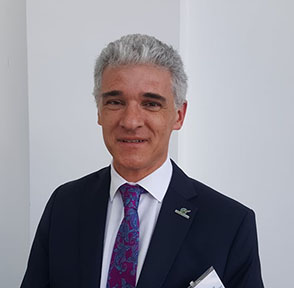The Private Sector Commission (PSC) has expressed disappointment at not being invited to a safety forum hosted here yesterday by the Energy Chamber of Trinidad and Tobago (ECTT), with some executives saying that it is tantamount to disrespect.
However, their Trinidadian counterparts said that while individual invitations were not sent out to private sector bodies, they placed advertisements inviting the public to the paid event, and that yesterday’s hosts have much to share in both the oil and gas sector and building of a robust safety culture with its CARICOM sister nation.
With the Arthur Chung Conference Centre as the location, the ECTT yesterday hosted a one-day forum named ‘Guyana Safety Forum 2019’ which was themed as ‘Building a robust safety culture for private sector development”.

However, PSC members complained bitterly that they were not invited and would have benefited significantly from such a conference that detailed aspects of health and safety.
“I feel surprised that they would have done that and not engaged with us. They obviously have a different agenda; one which does not include local content as part of their own strategy or contributing to Guyana’s development,” Chairman of the PSC Gerry Gouveia yesterday said.
“I hold, and we have always taken a position, to work very closely with our Caribbean brothers and sisters. We welcome the Caribbean but mutual respect must be the foundation of our relationship. I am open to meet with them or any one from the Caribbean chambers of commerce at any time,” he added.
Former PSC Vice President, Deodat Indar said that not inviting the Guyanese private sector organizations to a safety forum that focuses on work with the private sector was “borderline disrespectful” .
Indar said that the local PSC could “never get away with that in Trinidad and Tobago” and feels that Trinidadian organisations should aim to foster better relationships.
“We believe that if they come to Guyana, the manners is that you come to your compatriot chamber, leaving us out is not the way to go. Coming to us will be the preferred way to go about building institutional alliances in Guyana, but there is nothing stopping them from doing what they are doing. We believe as organisations, we should have a little more collaboration. We believe that should be the best way to go forward,” Indar stressed.
This newspaper was told by one of the organisers that there seemed to be a “misunderstanding of cultures” on formal invitations to individual organisations as advertisements were placed inviting the public to the event.
In one of the question and answer segments, a Trinidadian businessman pointed to the trepidations of some Guyanese in trusting business persons from his country.
Deviate
Head of the ECTT, Dr. Thackwray ‘Dax’ Driver told Stabroek News that he did not want to deviate from the event’s focus on safety but said that Guyanese should not fear Trinidadians coming here as there is much this country could learn especially in areas of oil and gas.
“Trinidadian companies are not coming to take over, Trinidadian companies are coming because they are seeing business opportunities in a fast developing area where there are huge opportunities that exist for everybody. We are here because we have a lot of experience and the Trinidadian Chamber…we help our members meet those international requirements. So we offer a service to our member companies to be able to meet those international requirements so they can operate and I think that is something we can offer to people in Guyana; our knowledge and experience of what it takes for you to meet those requirements” Driver said.
“We have had some things which they should not have gone (the way they did) so there are lessons we can share talking about our safety programme. You don’t have to make that same mistake you can learn from our mistake so you don’t have to. You can learn the lessons already,” he added.
Driver said that with Guyana’s emerging oil and gas sector, he believes that there will be a diversity of roles for companies to play within the sector.
Already, a number Trinidadian companies have established a business footing here and Driver said that his chamber has seen interests from larger companies that are going to be selling to major operators and other Trinidadian companies which are looking to partner or act as an intermediaries for Guyanese service companies.
“We are a real mix of Trinidadian companies. There is the freedom of capital to move around the Caribbean so companies are going to be here and investing. Some things that used to be invested directly from Trinidad to Guyana’s offshore industry, and that has been going on for a while …over time you will see that shifting and coming directly from here,” he said.
The ECTT President emphasized that there is much Guyana could learn from its sister CARICOM country as after 100 years of an oil and gas sector, many skills could be transferred and experiences shared.
Against the background of yesterday’s conference, Driver pointed out that the standards which companies need to meet to operate in the oil and gas industry are the same throughout the world and it was one this country can learn from.
High international standards
“The same standards Exxon applies in Guyana it is the same they will do in every part – say the Gulf of Mexico. So companies if they want to compete they have to meet those high international standards. The companies in Trinidad obviously have that experience in meeting those standards because they have been for many decades. Trinidadians already have that experience, they have a work force that meets those requirements. What each Guyanese private sector company will have to decide if it wants to be part of this business (is) what’s the best route to take…,” he said.
“Safety is absolutely critical. You heard the presentations today from Exxon and SAIPEM , Massy Gas Products … so safety is absolutely critical because companies know they are in a high risk environment and have to internalize and absolutely believe that every worker that comes out to work will go home safe. That is what the big players expect so they expect all of the players that are selling them services, to meet those same requirements. So for Guyanese companies meeting those same requirements, that is step one. You cannot get through the door if you are not meeting those requirements. The international companies will not lower their standards to do business with Guyanese companies nor should you ask them to or want them to because you want your people safe. You do not want people killed by the industry, you should be pushing international operations to have the highest standard and you should be pushing your local private sector to step up meet those requirements. How they do that that will be individual choices,” he added.
Last year September, Guyana and Trinidad inked a long-awaited Memorandum of Understanding (MoU) on Energy Sector Cooperation with both President David Granger and Trinidadian leader Dr. Keith Rowley assuring that there is no need to fear any “takeover” of the energy sector by either side.
“There is nothing in the MoU which seeks to harm the interest of one state or the other. There is no sellout. There were some unjustified fears that Guyana is giving away the family jewels but that is not true. It is simply a means of collaborating,” Granger had said at the signing.
The T&T Prime Minister had said that specific teams from both countries will work on specific projects and problems to either initiate, ameliorate or generate the kinds of outcome to contribute to the growth of the economies and the sustenance of the peoples of both countries.
And only recently former Minister of Energy of T&T, Kevin Ramnarine, stated that his country must position itself to be the logistics hub for Guyana’s booming oil sector.






